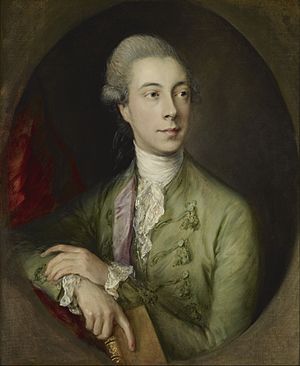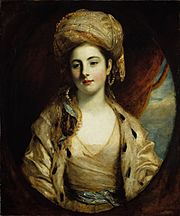Richard Paul Jodrell facts for kids

Richard Paul Jodrell (born 13 November 1745 – died 26 January 1831) was a smart scholar who studied ancient Greek and Roman writings. He was also a playwright, meaning he wrote plays.
Contents
About Richard Paul Jodrell
Richard Paul Jodrell was born on November 13, 1745. His father, Paul Jodrell, was a lawyer for Frederick Prince of Wales. His mother was Elizabeth Warner. Richard had two brothers, Sir Paul Jodrell and Henry Jodrell.
Richard's father passed away in 1751 when Richard was young. He inherited his family's land and kept it for almost 80 years.
His Education and Writings
Richard went to Eton College, a famous school, and then to Hertford College, Oxford University. He loved studying classical subjects like ancient Greek and Roman literature. He even wrote some pieces for a collection called Musae Etonenses while at Eton.
Later, he wrote more serious books:
- In 1778, he helped with notes for a book about the ancient Greek writer Aeschylus.
- In 1781, he published Illustrations of Euripides, which was about two plays by another Greek writer, Euripides.
- In 1790, he wrote another volume about Euripides' play Alcestis.
Richard as a Playwright
Richard Paul Jodrell also enjoyed writing plays for the theater.
- His play, A Widow and no Widow, was performed in 1779. It was printed in 1780.
- In 1783, his play Seeing is Believing was performed and was quite successful.
- He wrote a serious play called The Persian Heroine. Even though it wasn't performed in the biggest theaters, it was printed in 1786.
- In 1787, he published Select Dramatic Pieces, a collection of plays. Some of these were performed in smaller theaters, and others were written for private shows or fun in the countryside. This collection included:
- Who's Afraid? (a short, funny play)
- The Boarding School Miss (a comedy)
- One and All (another short, funny play)
- The Disguise (a comedy)
- The Musico (a short, funny play)
- The Bulse (a dramatic piece)
- He also wrote The Knight and Friars, a historical story, in 1785.
Clubs and Honors
In 1784, Richard joined a special club in Essex that was started to support the famous writer Dr. Johnson in his later years. Richard was one of the very last people from that club to pass away.
He was also chosen to be a member of important groups:
- The Royal Society in 1772 (for science).
- The Society of Antiquaries in 1784 (for history and old things).
- He received a special degree called D.C.L. from Oxford University in 1793.
Time in Parliament
In 1790, Richard Paul Jodrell was elected to represent Seaford in the British Parliament. However, a committee later decided he wasn't properly elected, so he lost his seat in 1792.
He got another chance in 1794 when he was re-elected for Seaford. But after 1796, he did not serve in Parliament again.
Later Life and Passing
As Richard grew older, he became unwell. He passed away in London on January 26, 1831.
Richard Paul Jodrell's Family

On May 19, 1772, Richard married his second cousin, Vertue Hase. She was the oldest daughter of Edward Hase from Salle, Norfolk. Vertue passed away on May 23, 1806.
Richard and Vertue had seven children:
- Paul and another son named Paul, who both died when they were babies.
- Sir Richard Paul Jodrell: He went to Oxford University. In 1817, he became a Baronet (a special title) after his great-uncle, Sir John Lombe, passed away. In 1814, he married Amelia Caroline King and had several children.
- Edward Jodrell: He also went to Oxford University. In 1812, he married Mary Stone and had children.
- The Reverend Sheldon Jodrell: He went to Cambridge University and became a Rector (a type of church leader) in Saxlingham, Norfolk.
- Sophia.
- Louisa: She was Sophia's twin. She married Richard Jennings and passed away in 1826.
 | George Robert Carruthers |
 | Patricia Bath |
 | Jan Ernst Matzeliger |
 | Alexander Miles |

